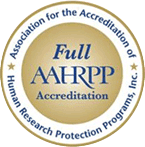Index
FDA Guidance on Complex Innovative Trial Design for Drugs and Biological Products
Announcement: Upcoming Lecture, “The Immortal Life of Henrietta Lacks”: A Discussion of Race and Medical Ethics
IRB Fees: The Cost of IRB Review
External and Commercial IRB Q&A – What is the Submission and Review Process for Commercial IRB Applications (WCG/WIRB, Advarra, etc.)?
Herky Hints: Linking an External Funding Source in Section III
IRB Advisor Newsletter, November 2020
In the News
FDA Guidance on Complex Innovative Trial Design for Drugs and Biological Products
By Kelly O’Berry, BS, CIP
Recently published Food and Drug Administration (FDA) guidance, Interacting with the FDA on Complex Innovative Trial Designs for Drugs and Biological Products, includes information for researchers who serve as sponsor/investigators.
In most cases, the study sponsor takes care of FDA submissions. However, when a UI researcher holds an Investigational New Drug (IND) approval or Investigational Device Exemption (IDE) with the FDA, they are considered a sponsor/investigator and must satisfy the requirements for both positions.
The new FDA guidance covers how sponsors can obtain feedback on technical issues related to modeling and simulation. It also provides suggestions for the type of quantitative and qualitative information to submit for FDA review.
The guidance document provides a detailed description of the characteristics of a complex innovative design (CID). Since what is considered innovative or novel could change over time, there is no specific definition of a CID. The guidance document also provides suggestions for what to include in different types of CID proposals.
Keep in mind that FDA guidance describes the agency’s current thinking on a particular topic and is considered a recommendation. FDA guidance is not legally enforceable.
Announcement: Upcoming Lecture, “The Immortal Life of Henrietta Lacks”: A Discussion of Race and Medical Ethics
By Kelly O’Berry, BS, CIP
Primary IRB Chair, Andy Bertolatus, will serve as the moderator for the question-and-answer style format. The link to the livestream is posted on the UI Lecture Committee website: https://lectures.uiowa.edu/lectures/ We invite and encourage you to attend this lecture if you can.
Lacks was a Black woman who received treatment for cancer at Johns Hopkins University hospital in 1951. Her cells were taken without her knowledge or permission and used to create cell lines that were used, and are still being used, for developing vaccines, cloning, gene mapping, and more. These cells are commonly referred to as HeLa cells, but the research community did not always associate the correct name for the donor of the cells. In 2010, Rebecca Skloot published a book called The Immortal Life of Henrietta Lacks that explores the ethical issues of the collection of these cells and her surviving family members’ perspectives on their ongoing use. In 2017, HBO released a film adaptation of the book.
This lecture will explore issues of race and ethics with regard to participation and results of human subjects research and the broader issues of medical research ethics.
IRB Fees: The Cost of IRB Review
By Kelly O’Berry, BS, CIP
The Human Subjects Office (HSO) provides an essential service to the UI research community, as administrative support for the Institutional Review Board (IRB) and the hub of the UI Human Research Protection Program (HRPP). For most UI researchers, there is no charge for IRB review and other services provided by the HSO. However, there are some projects that the IRB must charge a fee for the review. This article provides an overview of the types of projects for which the HSO/IRB assess fees and how those fees are used.
IRB Fees
According to the IRB fees memo from January 14, 2019, the UI IRB charges fees for the following types of projects:- Industry-Sponsored Projects Sent to an External IRB – These projects are submitted in the HawkIRB system for review by the appropriate UI HRPP committees and to manage and oversee compliance with institutional policies. The fee for initial review is $1,500 and there is an annual fee of $750 for continuing review of the protocol.
- Industry-Sponsored Projects Reviewed by the UI IRB – The fee for initial full board review is $2,500 and there is an annual fee of $1,000 for continuing review. If the project qualifies for expedited review (full board review is not required), the fee is $1,000 for initial review and an annual fee of $500 for continuing review. There is no charge for projects that qualify for Exempt Status. There is no additional charge for Modification forms. Fees are charged directly to the project account as soon as an MFK is available. Researchers must include IRB fees in the project budget and request reimbursement from the sponsor.
- Projects Reviewed by IRB-03, the VA Health Care System (VAHCS) IRB – VAHCS contracts with the UI to provide IRB oversight for human subjects research conducted by VA employees. The fee for initial full board review is $2,500 and there is an annual fee of $1,000 for continuing review. If the project qualifies for expedited review (full board review is not required), the fee is $1,000 for initial review and an annual fee of $500 for continuing review. There is no charge for projects that qualify for Exempt Status. There is no additional charge for Modification forms. Fees are charged directly to the VAHCS Administrative Office.
- Projects using a single IRB model, when the UI IRB is the Lead IRB – For projects funded by the National Institutes of Health (NIH), fees are assessed based on the type of awardee according to NIH policy. The Human Subjects Office will provide an estimate of fees that will be assessed for a single IRB of record model where the UI IRB serves as the lead IRB. This can be requested by completing a pregrant submission survey at least a week in advance of a federal grant submission deadline.
IRB Fees have remained unchanged since fiscal year 2017 but are expected to change for the upcoming fiscal year. Notification of these changes will be communicated in March or April to be effective July 1, 2021.
The HSO receives funding from General Education Funds (GEF) to support the staff positions and infrastructure required to oversee activities associated with a Human Research Protection Program.
HSO/IRB Services
When fully staffed, the Human Subjects Office has a total of 25 full time employees plus up to 4 student employees. In 2019, we added three new FTEs, two on the Application Review team and one in the Education and Outreach Program, to increase the services we provide to the UI research community. This year one additional position on the Application Review team is being added. There are 10 IRB Chairs that lead meetings and approximately 65 IRB members across the three active IRBs. The primary focus of the IRB is to protect the rights, safety and welfare of human research subjects. HSO staff, IRB Chairs and board members play a significant role in that effort.
The HSO is made up of four research compliance related programs:
- The largest HSO staff group is the Application Review Group which review HawkIRB applications to assist in ensuring the submission is consistent with regulatory and institutional policies prior to final review by an IRB Chair or the full board. These staff specialize in either biomedical or social behavioral research reviews. Some write minutes for IRB full board meetings.
- The Compliance Monitoring Program provides specialized monitoring, with an educational focus, of IRB approved projects to ensure ongoing regulatory and IRB compliance. Assistance with ClinicalTrials.gov compliance also falls under this program.
- The Education and Compliance Program provides a wide variety of educational services to the research community, including a monthly newsletter, initial training and continuing education for IRB members and HSO staff, and presentations on various topics to research-oriented courses and other small groups.
- The Conflict of Interest in Research Program provides a variety of services ensuring compliance with federal regulations and institutional policies for conflict of interest in research. It also manages institutional conflicts of interest on behalf of the Office of the President.
It may surprise many researchers to know that at any given time, there are around 4,300 open projects conducted by UI faculty, staff and student researchers across campus, on social/behavioral as well as biomedical topics. After initial approval, the IRB reviews protocol modifications for all projects and conducts an annual continuing review of all higher risk studies and a biennial review for minimal risk projects. On average, there are just shy of 10,000 forms annually submitted to the HSO\IRB for review!
External and Commercial IRB Q&A – What is the Submission and Review Process for Commercial IRB Applications (WCG/WIRB, Advarra, etc.)?
By Jarrod Feld, BA
For studies using a commercial IRB of record, the study will first need to be entered into HawkIRB with all attachments and applicable sections completed. The Human Subjects Office (HSO) and other Human Research Protection Program (HRPP) committees review and approve UI research related activities prior to submission to an external IRB.
HawkIRB section I.1
For studies using Western Copernicus Group (WCG, which also oversees WIRB), study teams can choose WIRB as the IRB of record. Note that you will need to click on the word WIRB (which is a link to several pre-project questions) and answer these items prior to moving forward with the submission. If HawkIRB does not allow you to move forward (due to federal or nonprofit funding source, embryonic stem cell research, studies involving xenotransplantation, or other specific situations outlined in this section), please contact the Human Subjects Office for additional guidance.
If a study is using Advarra or another commercial IRB of record, teams can select ‘other,’ under the External IRB Reliance heading, and enter the IRB’s name.
When progressing through the application in HawkIRB, you will see that many sections normally available will be greyed out. This information will be submitted to the commercial IRB and does not need to be provided in the HawkIRB application. To avoid duplication of effort, the HawkIRB application for a project overseen by a commercial IRB only contains information necessary to ensure compliance with UI policies and procedures.
Attachments
Study teams will need to attach a completed draft copy of the external IRB application that has not yet been submitted to the commercial IRB. Attach this document under the ‘copy of external IRB application’ heading.
WCG (WIRB’s) online system and documents can be found here (click on Connexus login, which is their online system name). Advarra’s site is here (click on IRB CIRBI login). Users may need to create an account to gain access to submission documents.
Other important attachments will include
- Draft consent/assent documents with edits made on the sponsor’s template (see the December 2020 article on creating consent documents for studies using a commercial IRB for more information)
- Copies of signed assurance(s)
- Drug/device brochures and completed G12, as applicable
- A copy of the most recent study protocol
UI Institutional Approval
Study teams need to ensure all relevant committees’ reviews and approvals are in place according to their respective processes and requirements. HRPP committee reviews (such as Pharmacy and Therapeutics aka P&T, Medical Radiation Protection aka MRPC, Holden Cancer Center’s Protocol Review and Monitoring Committee aka PRMC, Nursing Research Committee aka NRC, etc.) are made available in HawkIRB when the study has been moved past pre-screen in HawkIRB. However, other committees’ reviews and approvals take place outside of the HawkIRB system (for example Pathology and Clinical Research Unit reviews and approvals).
Because the University of Iowa and the HSO have a master service agreement with WCG/WIRB, teams may receive approval to submit the study prior to a contract being fully executed. When utilizing Advarra or other commercial IRBs of record, all approvals and contracts must be in place prior to approval to submit externally.
Regardless of the IRB of record, some UI committees’ approvals must be in place prior to approval to submit externally. If applicable, Conflict of Interest in Research Committee, P&T, PRMC, and MRPC must have issued their approval prior to submission to the commercial IRB. Please contact the HSO’s commercial IRB coordinator for more details about specific studies.
After Approval from the Commercial IRB
Once a study has been reviewed and approved to submit to the commercial IRB of record, and after the IRB of record has reviewed and approved, the HSO will ensure:
- all consent documents are aligned with the originally-approved edited versions and institutional requirements;
- that a contract is fully executed;
- that workflow is addressed;
- that appropriate reliance agreements and HIPAA waivers are accurate and in place;
- and that all other committees’ approvals have been received.
At this point the HSO coordinator will notify the commercial IRB of record to release any holds that may be in place, and the study will be approved and released to the team in HawkIRB.
For study modifications and continuing reviews, this process is generally reversed. Submit to the IRB of record first, then update HawkIRB when approval documents have been received. If the study team has questions about a modification prior to submitting to the IRB of record (for example, a sponsor has made changes to Iowa’s required injury compensation language), they should reach out to the HSO commercial IRB coordinator as needed.
A final important note: when using a commercial IRB, after study approval, always utilize the respective IRB’s online system (Connexus for WCG/WIRB, CIRBI for Advarra) to obtain the most recent consent and assent documents, IRB approval memos, subject-facing materials, etc. rather than HawkIRB, as Iowa is not serving as the IRB of record.
As always, when using a commercial IRB of record, if study teams need guidance, they are strongly encouraged to contact HSO’s commercial coordinator, Jarrod Feld, at UIWIRB@uiowa.edu (for WCG/WIRB) or UI-IRBExternal@uiowa.edu (for other commercial IRBs), or at the HSO general line 319-335-6564.
Herky Hints: Linking an External Funding Source in Section III
By Joanie Hoefer, BS, CIP
When you have external funding or sources of support for human subjects research activities, review is required by the Division of Sponsored Programs (DSP). In Section III of the HawkIRB application, external funding source(s) of support require linkage to the correct record in the Division of Sponsored Programs/University of Iowa Research Information System (DSP/UIRIS).
The HawkIRB application syncs directly with UIRIS. To link an external funding source in Section III.1 of the HawkIRB application:
- Select ‘External’ as the type of funding. An external funding source could be any one of the following:
- Federal Agency
- State\Local Agency
- Corporate\Industry
- Private Foundation\Association
- Educational Institution\Hospitals
- Foreign Governments
- Individuals (non-alumni\non-profit)
- Select ‘Yes’ to indicate that you routed the source of support for the study to DSP. Selecting ‘No’ may result in delays in beginning your research.
- A list will appear with all funding sources routed to DSP under the PI’s name. Select the appropriate source for the study and click ‘Add’.
- If the funding source is associated with another UI investigator’s name, select ‘Lookup’ to search for the funding sources, select the appropriate source, and click ‘Add’.
- Click the ‘Add Funding Source’ button to save the funding information.
Once the external funding source indicated in Section III.1 of the HawkIRB application has been linked to the UIRIS record, a chain link icon will appear to the left of the source of support:

Funding from internal sources, such as UI Institutional grants or awards, departmental funds, PI discretionary funds or PI personal funds, does not require routing through DSP. However, you still need to list all internal sources of funding in Section III.1 of the HawkIRB application.
If there is no funding for your study, select the ‘No Funding’ option in Section III.1. However, you should consider how the research team members’ and the PI’s time will be supported to conduct this research and how research expenses will be covered. It may be more appropriate to list an internal source of support for the study, such as departmental funding.
Taking the time to ensure that the HawkIRB application accurately reflects all of your study’s funding sources helps to synchronize the review of your study by the IRB and DSP.
IRB Advisor Newsletter, November 2020
By Kelly O’Berry, BS, CIP
IRB Advisor (a publication of Relias) is a monthly newsletter with articles about issues facing IRBs, Human Research Protection Programs (HRPPs) and researchers. Current and past issues of IRB Advisor are posted in the “IRB ICON Course for Researchers” which is accessible to anyone with an active UI HawkID. The portal to this ICON Course is on the Education and Training page of the Human Subjects Office website.
This month we are spotlighting articles from the October 2020 issue that all relate to COVID-19 research.
A COVID-19 Vaccine at ‘Warp Speed’ Raises Myriad Ethical Questions
This article reviews concerns and responses from key entities regarding the appearance of political influence for a possible premature release of one of the COVID-19 vaccines in development prior to the election. It also covers how IRBs might review the risks and benefits of a clinical trial differently when it is for a vaccine needed for a public health emergency or a pandemic.In early August, President Trump announced that he expected the vaccine to be approved before the November 3 general election. In early September the Centers for Disease Control told state governors to prepare for vaccine distribution in early November. There was concern that the President would prematurely release the vaccine using the Emergency Use Authorization (EUA) order.
Typically, the Food and Drug Administration decides when a vaccine can be approved based on scientific evidence. An EUA may be perfectly appropriate if certain conditions are met.
Vaccine Trials Should Follow the Four Ethical Principles
This article discusses four ethical principles that apply for all human subjects research, including decisions to stop a clinical trial or expedite approval of an investigational product. These ethical principles include:
- Autonomy
- Beneficence
- Nonmaleficence
- Justice
COVID-19 Misinformation Affects Everyone in Research Community
This article gives examples of fake cures and other misinformation that increased during the pandemic. One person interviewed referred to this rampant misinformation in social media posts as an “infodemic.” The article explores the consequences of this for IRBs and human subjects researchers.
Minority Recruitment for COVID-19 Trials is Low While Disease Burden is High
At the time this article was written, more than 350,000 people were willing to volunteer for a COVID-19 vaccine trial but only 10% of them were Black and Hispanic. And actual enrollment of Black and Hispanic study participants was only one in five volunteers. This article discusses the disproportionate impact on people of color and barriers for their participation in clinical research. It also explores what research organizations can do to reach out and increase minority participation in research.
Lessons Learned – or Not – from Hydroxychloroquine Mishap
The spread of misinformation during the COVID-19 pandemic has created distrust with IRB oversight and the clinical trial process that the research community has worked for decades to build up. This includes misinformation about the benefits of an antimalarial and lupus drug, hydroxychloroquine. Despite published research showing no difference between hydroxychloroquine and placebo, new prescriptions for the drug were 7.2 and 3.3 times higher in March and April 2020, respectively. On March 28, the Food and Drug Administration (FDA) issued an Emergency Use Authorization (EUA) order for oral formulations of hydroxychloroquine sulfate. But the FDA revoked the EUA less than three weeks later because the scientific evidence showed that the product didn’t meet FDA criteria for evidence-based effectiveness. The article provides an overview of the usual approach by the FDA and the approach taken with this particular drug.
In the News
- The Power of Pets, NIH News in Health
- Detecting Dementia, Bill of Health, Harvard Law, Petrie-Flom Center
- 2020 Has Been a Huge Year for Understanding the Process of Science, Scientific American
- The Lightening-fast Quest for COVID Vaccines – and What it Means for Other Diseases, Nature
- Sixteen Facial Expressions Occur in Similar Contexts Worldwide, Nature





